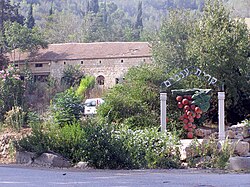This is an old revision of this page, as edited by Gilabrand (talk | contribs) at 07:41, 10 June 2012 (add). The present address (URL) is a permanent link to this revision, which may differ significantly from the current revision.
Revision as of 07:41, 10 June 2012 by Gilabrand (talk | contribs) (add)(diff) ← Previous revision | Latest revision (diff) | Newer revision → (diff) Place in Jerusalem, Israel| Kiryat Anavim Template:Hebrew | |
|---|---|
| Hebrew transcription(s) | |
| • official | Qiryat Anavim |
 First kibbutz building - a dairy barn, built in 1920 First kibbutz building - a dairy barn, built in 1920 | |
| Country | Israel |
| District | Jerusalem |
| Council | Mateh Yehuda |
| Affiliation | Kibbutz Movement |
| Founded | 1920 |
| Founded by | Immigrants from the Third Aliyah |
| Population | 313 |
| Website | www.kiryatanavim.com |
Kiryat Anavim (Template:Lang-he-n, lit. City of Grapes) was the first kibbutz established in the Judean Hills. It is located west of Jerusalem, and falls under the jurisdiction of the Mateh Yehuda Regional Council. In 2008 it had a population of 313.
History

The land on which the kibbutz stands was purchased from the neighboring village of Abu Ghosh. In 1912 the Abu Ghosh family sold thousands of dunams to Arthur Ruppin, who represented the Zionist movement. In 1919 a group of 25 pioneers from the Ukrainian town of Zhvanitz settled on the land, near a small spring called "Dilb." By the end of 1920, there were 200 pioneers on the kibbutz. In 1924, another group, Gordonia, arrived from Galicia, Poland.
On 9 November 1937, five members of Kiryat Anavim were killed by terrorists. Kibbutz Ma'ale HaHamisha (lit. Hill of the Five) was named for them.
During "The Hunting Season", Kiryat Anavim served as a base for the Haganah. They used the kibbutz watchtower as a jail for kidnapped Irgun members.
In the 1948 Arab-Israeli War, the 4th Battalion of the Palmach (Harel Brigade), with Uzi Narkiss, mounted their fight for Sha'ar HaGai, the road to Jerusalem, and the city itself, from Kiryat Anavim. Kiryat Anavim and the adjacent Ma'ale HaHamisha were the site of a battle for Mount Hagana in between, between the Palmach (including troops that retreated from the Radar Hill) and the Transjordanian Arab Legion.
On 6 September 1996, a fire in the Jerusalem corridor caused extensive damage in Kiryat Anavim and surroundings. Fifteen homes and 10 other buildings were damaged in the blaze.
Economy
In the early days, the pioneers operated a dairy and a poultry farm. In 1968, the kibbutz produced cherries, peaches, grapes, and plums; and operated a guest house, cotton fields and orange groves. Today the kibbutz runs a hotel and convention center. Anavid Insulation Products, founded in 1981, is wholly owned by Kibbutz Kiryat Anavim. The plant produces thermal insulation and sealing materials.
Landmarks
During Israel's War of Independence in 1948, many who fell in battle to secure the road to Jerusalem were buried at the kibbutz cemetery. A memorial monument was designed for the cemetery by Israeli sculptor Menahem Shemi. Soldiers of the Harel Brigade are among those interred here.
References
- ^ "Locality File" (XLS). Israel Central Bureau of Statistics. 2008. Retrieved 2010-07-10.
- Our History Kiryat Anavim
- Army of shadows: Palestinian collaboration with Zionism, 1917 – 1948 / Hillel Cohen
- "The "Hunting Season"". etzel.org.il. Retrieved 2008-12-13.
- A defender of Jerusalem The Jerusalem Post
- Yitzhaki, Aryeh (1988), A Guide to War Monuments and Sites in Israel, p. 59
- Israeli Fire Destroys 40 Homes; Allegations of Poor Response SNS Special Report, 8 September 1996
- Anavid Insulation Products
- Warriors' Final Resting Place: The Cemetery at Kibbutz Kiryat Anavim Gems in Israel, April 2000
Further reading
- Ed. Aviva Ufaz, Sefer Hachayim, the Diary of Kiryat Anavim, Yad Ben Zvi, 2001 Template:He icon
- 'Vehigadta Lebinha - 50 Years of Independence', Kiryat Anavim, 1998 Template:He icon
- 'Sipurei Kibbutzim' (Stories of Kibbutzim), Edited by Zeev Aner, Israel Ministry of Defense, 1998, ISBN 965-05-0946 Template:He icon
- 'Document and Fiction of the Third Aliya', written by Aviva Ufaz, Hakibbutz Hameuchad, 1996 Template:He icon